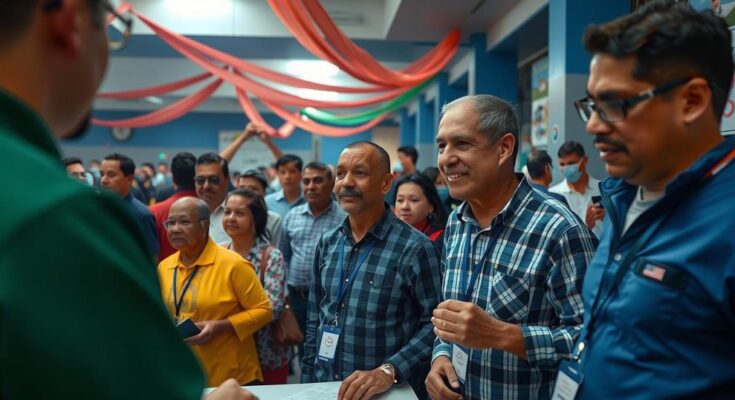Uruguay’s presidential run-off features former President Mujica’s leftist candidate Yamandu Orsi against National Party’s Alvaro Delgado. Voter turnout is crucial, with polls indicating a tightly contested election. The political atmosphere is relatively stable compared to other Latin American nations, though rising economic concerns could play a significant role.
Uruguayans are currently participating in a presidential run-off election, with voters faced with the choice between the leftist Frente Amplio (Broad Front) candidate Yamandu Orsi and Alvaro Delgado from the National Party. Former President Jose Mujica’s leftist alliance aims to reclaim power after five years of right-wing governance. Ballot stations opened at 8 a.m. local time and will close at 7:30 p.m., with initial results anticipated two hours following the conclusion of voting.
The election is particularly notable as opinion polls indicate a tight race, with potential for less than 25,000 votes to differentiate the candidates. Unlike the polarizing right-left dynamics observed in neighboring countries, Uruguay’s political landscape exhibits less tension and overlaps significantly between conservative and liberal coalitions. President Lacalle Pou’s administration has maintained a 50 percent approval rating despite criticism surrounding crime rates, which have presented challenges for the ruling right-wing coalition.
Yamandu Orsi, advocating for a “modern left” ideology, previously garnered 43.9 percent of votes in the initial October election. He faces Alvaro Delgado, who received 26.8 percent, supported by the Colorado Party, which together with Delgado’s National Party secured nearly 42 percent of the first-round votes. The outcome remains uncertain, as both candidates vie for the approximately 8 percent of voters who favored smaller parties in the first round.
In the lead-up to this decisive election, neither candidate has introduced significant new policy commitments. Observers have noted that a recent televised debate did not substantially impact voter opinions, with some members of the electorate expressing uncertainty regarding their voting choices. As the year concludes, the global trend of incumbent parties suffering losses could be challenged by Uruguay’s results, particularly as inflation and living costs continue to weigh on voter sentiments.
The current political landscape of Uruguay is a reflection of tensions and alignments between leftist and right-wing parties. Over the past five years, Uruguay has been governed by a right-wing coalition led by President Luis Lacalle Pou. This run-off election marks a potential turning point for the leftist bloc, which led the government prior to the current administration. The outcome will determine whether the Broad Front can reclaim leadership in a nation that traditionally prides itself on relative political stability and moderation, unlike the polarized political environments of its regional neighbors.
In summary, the presidential run-off in Uruguay presents a pivotal moment for both the leftist Frente Amplio and the National Party. As voter turnout approaches and the race remains neck-and-neck, the implications of this election could extend beyond national boundaries, challenging global trends surrounding incumbent party performance. With both candidates striving to resonate with undecided voters, the outcome may hinge on the electorate’s responses to pressing economic issues that characterize contemporary life in Uruguay.
Original Source: www.aljazeera.com




